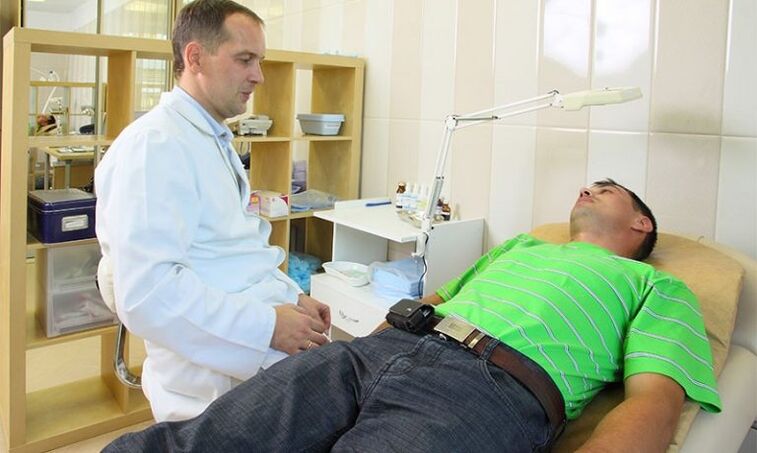A favorable outcome in the treatment of any disease depends entirely on the doctor, and this is a fact that even the doctors themselves will confirm. The same goes for prostatitis, because this complex male disease requires accurate diagnosis and in the future complex and competent therapy.

It is difficult to believe in it, but even the duration of treatment depends entirely on the doctor. Inflammation of the prostate gland manifests itself in many ways, from urinary problems to high fever. If similar symptoms are observed and there is a suspicion of the presence of this disease, which doctor should I contact for prostatitis?
Urologist - doctor for the treatment of prostatitis
So, if a man notices some problems in the genital area, as well as if there are "problems" in the work of the urinary system, he should contact a single doctor - a urologist. At the first appointment at the clinic, it is important to pay attention to the way the doctor is doing his job, because the duration of the therapy and its final outcome will now depend on him.
Furthermore, if possible, it is advisable to immediately consult some doctors of this specialization. But first, you will need to do a series of studies to visit urologists offices with ready-made results.
How does a urologist diagnose prostatitis?
The first thing to expect from a urologist is the anamnesis. In other words, the doctor conducts a conversation with the patient, in which he clarifies some questions about his personal life, including the intimate one, and asks in detail about all the complaints and symptoms.
Further examination of the patient will be necessary. Palpation is a way to examine a patient, during which the doctor determines the size, consistency and softness of the prostate gland. Based on this, the urologist can make a preliminary diagnosis of the presence of prostatitis.
To confirm the diagnosis, the doctor prescribes a series of studies. A blood and urine test is mandatory, often in addition, a secret of the prostate gland is taken to determine the number of leukocytes, amyloid bodies and lecithin granules.
Analysis of urethral secretion will help to determine if glandular inflammation has affected the urethra. To do this, take a stain using a special probe with a tampon, which is inserted directly into the urethra.
To determine the nature of prostatitis and if an infectious etiology is suspected, a blood culture is performed. It will help identify a group of pathogenic microorganisms that have settled in a man's body.
Based on the degree to which the doctor performs a comprehensive examination and how much or how little analysis he prescribes, it can be concluded which doctor should be contacted for prostate - the urologist at the polyclinic at the place of registration, or the one working at another institution. . .
What other doctors are involved in treating prostatitis?
It is already known which doctor to contact for acute or chronic prostatitis, but you should also know that not only a urologist will have to meet with a patient.

Often in the treatment of inflammation of the prostate gland, physiotherapeutic methods are prescribed to influence the inflammatory process in the organ. So, for the procedures recommended by the urologist, the patient will meet with a physiotherapist.
These procedures include:
- Baths;
- Electrophoresis;
- A magnetic field;
- Ultrasound;
- Galvanization;
- Light therapy;
- Inductotherm;
- Microwave therapy;
- Laser therapy.
An effective treatment regimen can not be such if you do not take measures to strengthen the immune system. This means that another doctor involved in treating prostatitis is an immunologist.
By the way, to the question of which doctor you should go to for chronic prostatitis, you can also answer an immunologist, but only after talking to a urologist and doing tests of the patient's blood and urine.
Inflammation of the prostate gland in this form requires the correct and smooth functioning of the immune system and only an immunologist can prescribe the right medication.
Problems in the genital area, especially with chronic prostatitis, often have a detrimental effect on a man's psyche. For her, the impossibility of having a full sex life becomes comparable to the end of the world. There can be complexes to this, stress, anger and deep depression.

The psychotherapist usually not only conducts conversations with the patient, but also prescribes sedatives to help him cope with the depressive state and adjust to the treatment.
The psychotherapist plays a special role in the treatment of prostatitis, because if the patient regains self-confidence and believes in healing, he will come much faster.
If there is no urologist in the clinic but there is an andrologist, you can contact him. He specializes exclusively in male diseases, which include inflammation of the prostate.
























